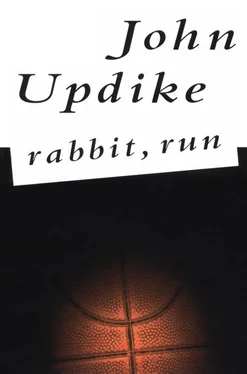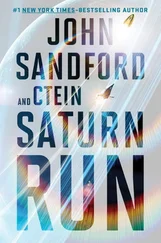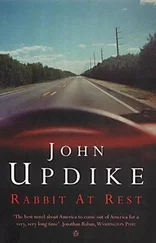When they get inside the apartment she gives a sharp sigh and collapses against him. Perhaps she didn't expect the place to be full of sunshine; buttresses of dust drifting in milky light slant from the middle of the floor to the tops of the windows. The door to his closet is near the entry door so they needn't go very deep into the apartment at first. He opens the closet door as far as he can without bumping the television set and reaches far in and unzips a plastic zippered storage bag and takes out his blue suit, a winter suit made of wool, but the only dark one he owns. His gray carsalesman's suit is too pale. Nelson, happy to be here, ranges through the apartment, going into the bathroom, finding an old rubber panda in his bedroom that he wants to take along. His exploring drains enough of the menace from the rooms for them to go into their bedroom, where Janice's clothes hang. On the way she indicates a chair. "Here I sat," she tells him, "Monday morning, watching the sun come up." Her voice is lifeless; he doesn't know what she wants him to say and says nothing. He is holding his breath.
Yet in the bedroom there is a pretty moment. She takes off her skin and blouse to try on an old black suit she has, and as she moves about in her slip, barefoot on the carpet, she reminds him of the girl he knew, with her narrow ankles and wrists and small shy head. The black suit, bought when she was in high school, doesn't fit; her stomach is still too big from having the baby. And maybe her mother's plumpness is beginning. Standing there trying to get the waist of the suit skirt to link at her side, the tops of her breasts, swollen with untaken milk, pushing above her bra, she does have a plumpness, a fullness that call to him. He thinks Mine, my woman, but then she turns and her smeared frantic face blots out his pride of possession. She becomes a liability that painfully weights the knot below his chest. This is the wild woman he must steer with care down a lifelong path, away from Monday morning. "It won't do it!" she screams, and jerks her legs out of the skirt and flings it, great twirling bat, across the room.
"You have nothing else?"
"What am I going to do?"
"Come on. Let's get out of here and go back to your place. This place is making you nervous."
"But we're going to have to live here!"
"Yeah, but not today. Come on."
"We can't live here," she says.
"I know we can't."
"But where can we live?"
"We'll figure it out. Come on."
She stumbles into her skirt and puts her blouse over her arms and turns away from him meekly and asks, "Button my back." Buttoning the pink cloth down her quiet spine makes him cry; the hotness in his eyes works up to a sting and he sees the little babyish buttons through a cluster of discs of watery light like petals of apple blossoms. Water hesitates on his lids and then runs down his cheeks; the wetness is delicious. He wishes he could cry for hours, for just this tiny spill relieves him. But a man's tears are grudging and his stop before they are out of the apartment. As he closes the door he feels he has spent his whole life opening and closing this door.
Nelson takes the rubber panda along and every time he makes it squeak Rabbit's stomach aches. The town now is bleached by a sun nearing the height of noon.
The hours that follow are so long they seem to contain the same incidents over and over. Back in the house, Janice and her mother merge and re—merge in soft little conversations that take them from room to room. They seem to be worrying what Janice will wear. The two of them go upstairs and in half an hour Janice comes down in a pinned—in black dress of her mother's that makes her look like her mother. "Harry. Does it look all right?"
"What in hell do you think this is going to be? A fashion show?" He adds regretfully, "You look fine," but the damage is done. Janice emits a long startled whimper and goes upstairs and collapses into her mother. Mrs. Springer revokes the small measure of pardon she had extended him. The house again fills with the unspoken thought that he is a murderer. He accepts the thought gratefully; it's true, he is, he is, and hate suits him better than forgiveness. Immersed in hate he doesn't have to do anything; he can be paralyzed, and the rigidity of hatred makes a kind of shelter for him.
It becomes one o'clock. Mrs. Springer comes into the room where he is sitting and asks, "Do you want a sandwich?"
"Thanks, I can't eat anything."
"You better have something." He finds this insistence so strange he goes into the kitchen to see what is there. Nelson is having soup and raw carrots and a Lebanon baloney sandwich by himself at the table. He seems uncertain if he should smile at his father or not. Mrs. Springer keeps her back turned.
Harry asks, "Has the kid had a nap?"
"You might take him up," she says, without turning. Upstairs in the room with the one—eyed teddy bear Harry reads the boy a Little Golden Book about a little choo—choo who was afraid of tunnels. By the time the choo—choo has proved he is no longer afraid Nelson has fallen asleep under his father's arm. Harry goes downstairs again. Janice is having a rest in her room and the sound of Mrs. Springer's sewing machine, as it adjusts the dress for Janice to wear, spins out into the birdsong and murmur of the early afternoon.
The front door slams and Springer comes into the living room. None of the shades has been pulled up and he starts at seeing Harry in a chair. "Harry! Hello!"
"Hello."
"Harry, I've been down at Town Hall talking to Al Horst. He's the coroner. Al looked the little body over and he's satisfied. No marks. Accidental drowning. He promised there won't be a manslaughter charge. He's been talking to just about everybody and wants to talk to you sometime. Unofficially."
"O.K." Springer hangs there, expecting some kind of congratulation. "Why don't they just lock me up?" Harry adds.
"Harry, that's a very negative way to think. The question I always ask myself in a bad situation is, How do we cut the losses from here on in?"
"You're right. I'm sorry." It disgusts him to feel the net of law slither from him. They just won't do it for you, they just won't take you off the hook.
Springer trots upstairs to his women. Footfalls pad above. Fancy dishes in the glass—fronted cupboard behind Harry vibrate. It's not yet two o'clock, he sees by the little silver—faced clock on the mantel of the fake fireplace.
He wonders if the pain in his stomach comes from eating so little in the last two days and goes out to the kitchen and eats two crackers. He can feel each bite hit a scraped floor inside. The pain increases. The bright porcelain fixtures and metal surfaces seem charged with a negative magnetism that pushes against him and makes him extremely thin. He goes into the shadowy living room and pulls the shade and at the front window watches two teenage girls in snug shorts shuffle by on the sunny sidewalk. Their bodies are already there but their faces are still this side of being good. Funny about girls about fourteen, their faces have this kind of eager bunchy business. Too much candy, sours their skin. They walk as slowly as time to the funeral passes, as if if they go slow enough some magic transformation will meet them at the corner. Daughters, these are daughters, would June —? He chokes the thought. The two girls passing, with their perky butts and twopointed T—shirts, seem distasteful morsels. He himself; watching them behind the window, seems a smudge on the glass. He wonders why the universe doesn't just erase a thing so dirty and small. He looks at his hands and they seem ugly, worse than claws.
He goes upstairs and with intense care washes his hands and face and neck. He doesn't dare use one of their fancy towels. Coming out with wet hands he meets Springer in the muted hallway and says, "I don't have a clean shirt." Springer whispers "Wait" and brings him a shirt and black cufflinks. Harry dresses in the room where Nelson sleeps. Sunlight creeps under the drawn shades, which flap softly back and forth almost in time to the boy's heavy breathing. Though he spaces the stages of dressing carefully, and fumbles for minutes with the unaccustomed cufflinks, it takes less time to dress than he hoped it would. The wool suit is uncomfortably hot, and doesn't fit as well as he remembered. But he refuses to take off the coat, refuses to give somebody, he doesn't know who, the satisfaction. He tiptoes downstairs and sits, immaculately dressed, the shirt too tight, in the living room looking at the tropical plants on the glass table, moving his head so that now this leaf eclipses that, now that this, and wondering if he is going to throw up. His insides are a clenched mass of dread, a tough bubble that can't be pricked. The clock says only 2:25.
Читать дальше












